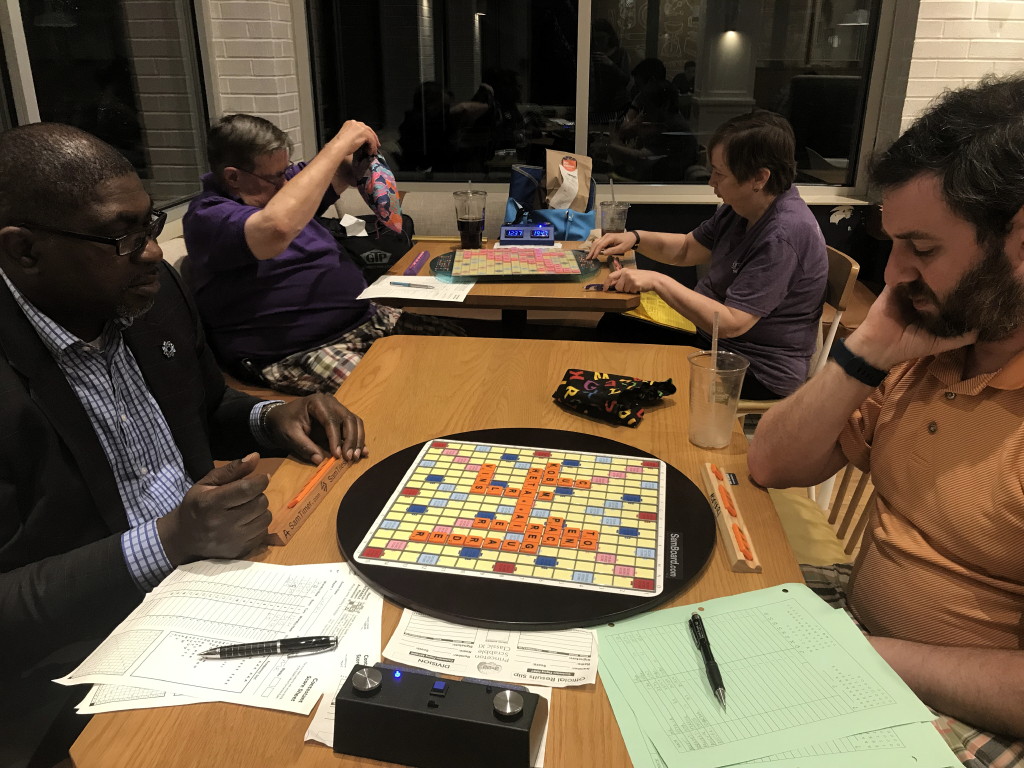Looking up at his Scrabble opponent, Judy Cole realized that her next word, “opalize,” was not actually a valid word in the now 80-year-old board game. She’d have to rethink what she was going to do next.
Every Tuesday, the Princeton Scrabble Club #513 set up boards and timers in the back of the Panera Bread in Princeton’s Nassau Park for an evening of high-level play. It’s a process that has been going on for the past 20 years.
And while many people have since ditched traditional board games for their online or mobile equivalent, like Words with Friends, Cole is just one member of a long-running club in Princeton that agrees nothing compares to a physical Scrabble board.
“It’s the strategy for me, because we can use so many different words from different languages and every field imaginable,” Club Director Lynda Woods Cleary said. “So, I like it for that reason, I always approach the board as a problem to solve.”
Cleary and her husband started the Princeton Scrabble Club two decades ago, posting flyers in every Mercer County library and supermarket to attract fellow Scrabble enthusiasts. The group began meeting in Barnes & Noble at MarketFair, and later Borders Books before coming to Panera Bread.
People in the area expressed interest in the club, with retirees attending meetings to play what was their “favorite childhood game,” Cleary said.
“I was happy that I was fulfilling a need for people in the area,” she added. “This game, you don’t have to have any special skills at all.”
For the uninitiated, Scrabble is a word game, currently manufactured by Hasbro, that has two to four players placing letter tiles onto a board consisting of a 15 x 15 grid. Letters placed on the board must form words that can be read in rows or columns and can be found in a standard dictionary. Each letter has a point value and depending on where they are placed, those points can be multiplied. The player with the most points wins.
The game, which was designed by Alfred Mosher Butts in 1938, is sold in more than 100 countries and is available in 29 languages.
On a recent August evening, Cleary and club members Ayo Adeyeri,Jason Keller and Cole prepared for the first game of the evening by mixing their letter tiles in small fabric bags and firing up a piece of Scrabble computer software called Zyzzyva, named after a snouted beetle.
Players come when they can, Cleary said, with 12 to 16 regular and closely affiliated members being the average number of people in the club.
The group’s individual members have competed in competitions ranging from single day or weekend local tournaments to national and international championships.
Keller recently placed third in the North American Scrabble Championship, which took place on Aug. 4 to 8 in Buffalo, N.Y. Playing with a dictionary used in international competitions, Keller went against players from Australia, the United Kingdom, Singapore, Nigeria and 49 states and provinces.
Keller, who also solves crossword puzzles competitively, said Scrabble has always been a part of his life. He and his mother would play when he was age 8, and adding an “s” to the end of a word was about as advanced as the game play would get, he said.
However, his interest in the game took off 11 years ago when he was browsing Borders Books and found “Word Freak” by Stefan Fatsis.
“I didn’t have any summer reading so I thought, ‘I’m gonna check this out,’” he said.
Fast forward more than a decade later, and he compares Scrabble to any other sport, thanking his competitors for pushing him to enhance his skills.
“For me, there’s always something more to strive for, and one thing that I’m thankful for, is that there are enough people I know and who I’ve met around the country and around the world who give it that sort of treatment,” he said. “There’s always something that you can improve on.”
The most points he has scored on a single word, he said, was during a 2016 tournament — “Klezmers,” worth 212 points.
Websites like Cross-Tables.com treat the boardgame like a sport, as well, showing upcoming tournaments, statistics and how many games a single player has won over a certain period of time.
Adeyeri began playing Scrabble again just this year after stopping when he moved to the states from Nigeria — the “Scrabble capital of the world” — 20 years ago.
Cole, on the other hand, has been playing for as long as she can remember. She had been a member of the Scrabble Association for 20 years prior to going to clubs in 2006, but her interest peaked in college.
While the group’s experience varies, there is one thing they all have in common: they are problem solvers.
“I was fascinated by intellectual board games with strategy,” Adeyeri said. “It helps you think, it develops your mind. I have a problem solving mentality. The whole game is a problem, and you have to figure out how to solve them.”
While the group has been playing Scrabble individually and with groups for multiple years, and decades for some, they said they can never get tired of it.
“It’s a lot of fun playing with these guys,” Adeyeri said. “Once you enjoy the game, you can’t put it down.”
The next Princeton Scrabble club weekend tournament will take place on March 29 to 31 at the Princeton Marriott at Forrestal on College Road East. While new members are welcome, they are required to join the national organization at ScrabblePlayers.org.

